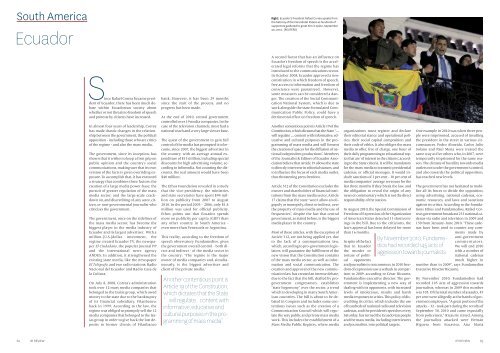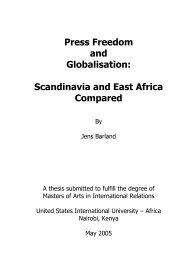FOCUS ON THE AMERICAS - International Press Institute
FOCUS ON THE AMERICAS - International Press Institute
FOCUS ON THE AMERICAS - International Press Institute
You also want an ePaper? Increase the reach of your titles
YUMPU automatically turns print PDFs into web optimized ePapers that Google loves.
South America<br />
Ecuador<br />
Since Rafael Correa became president<br />
of Ecuador, there has been much debate<br />
within Ecuadorean society about<br />
whether or not threats to freedom of speech<br />
and protests by citizens have increased.<br />
In almost four years of leadership, Correa<br />
has made drastic changes in the relationship<br />
between the government, the political<br />
opposition - including those who are critics<br />
of the regime - and also the mass media.<br />
The government, since its inception, has<br />
shown that it wishes to keep a firm grip on<br />
public opinion and the country’s social<br />
communications, making sure that its own<br />
version of the facts is given overriding exposure.<br />
To accomplish that, it has executed<br />
a strategy that combines three factors: the<br />
creation of a large media power-base; the<br />
pursuit of greater regulation of the mass<br />
media sector; and the large-scale crackdown<br />
on, and discrediting of, any actor, citizen,<br />
or non-governmental journalist who<br />
criticizes the government.<br />
The government, once on the sidelines of<br />
the mass media sector, has become the<br />
biggest player in the media industry of<br />
Ecuador and its largest advertiser. With a<br />
million-[U.S.]dollar investment, the<br />
regime created Ecuador TV, the newspaper<br />
El Ciudadano, the popular journal PP<br />
and the international news agency<br />
ANDES. In addition, it strengthened the<br />
existing state media, like the newspaper<br />
El Telégrafo, and two radio stations: Radio<br />
Nacional del Ecuador and Radio Casa de<br />
la Cultura.<br />
On July 8, 2008, Correa’s administration<br />
took over 12 mass media companies that<br />
belonged to the Isaias group, which owed<br />
money to the state due to the bankruptcy<br />
of its financial subsidiary, Filanbanco,<br />
back in 1999. According to the law, the<br />
regime was obliged to promptly sell the 12<br />
media companies that belonged to the Isaias<br />
group in order to give back the lost deposits<br />
to former clients of Filanbanco<br />
bank. However, it has been 29 months<br />
since the start of the process, and no<br />
progress has been made.<br />
At the end of 2010, central government<br />
controlled over 19 media companies. In the<br />
case of the television channels, most had a<br />
national reach and a very large viewer base.<br />
The quest of the government to gain full<br />
control of the media has prompted it to become,<br />
since 2007, the biggest advertiser in<br />
the country, with an average annual expenditure<br />
of $15 million, including special<br />
discounts for high advertising volume, according<br />
to Infomedia. Not counting the discounts,<br />
the real amount would have been<br />
$40 million.<br />
The Ethos Foundation revealed in a study<br />
that the vice-presidency, the ministries<br />
and state secretaries have spent $94 million<br />
on publicity from 2007 to August<br />
2010. In the period 2003 – 2006, only $1.4<br />
million was used for official publicity.<br />
Ethos points out that Ecuador spends<br />
more on publicity per capita (GDP) than<br />
any other country in South America -<br />
even more than Venezuela or Argentina.<br />
This reality, according to the freedom of<br />
speech observatory Fundamedios, gives<br />
the government overall control - both direct<br />
and indirect - of the media sector in<br />
the country: “The regime is the major<br />
owner of media companies and, simultaneously,<br />
is the biggest advertiser and<br />
client of the private media.”<br />
Another contentious point is<br />
Article 19 of the Constitution,<br />
which dictates that the State<br />
“…will regulate…content with<br />
informative, educative and<br />
cultural purposes in the programming<br />
of mass media”.<br />
Right: Ecuador's President Rafael Correa speaks from<br />
the balcony of the Carondolet Palace as hundreds of<br />
supporters gathered to greet him in Quito, September<br />
30, 2010. (REUTERS)<br />
A second factor that has an influence on<br />
Ecuador’s freedom of speech is the accelerated<br />
legal reforms that the regime has<br />
introduced to the communications sector.<br />
In October 2008, Ecuador approved a new<br />
constitution in which freedom of speech,<br />
free access to information and freedom of<br />
conscience were guaranteed. However,<br />
some measures can be considered a danger.<br />
The creation of the Social Communication<br />
National System, which is due to<br />
work alongside the state-formulated Communication<br />
Public Policy, could have a<br />
detrimental effect on freedom of speech.<br />
Another contentious point is Article 19 of the<br />
Constitution, which dictates that the State “…<br />
will regulate … content with informative, educative<br />
and cultural purposes in the programming<br />
of mass media and will foment<br />
the creation of spaces for the diffusion of national<br />
independent productions”. Members<br />
of the Journalist & Editors of Ecuador Association<br />
believe that Article 19 allows the state<br />
to directly intervene in editorial stances, and<br />
to influence the focus of each media outlet,<br />
thus threatening press freedom.<br />
Article 312 of the Constitution excludes the<br />
owners and shareholders of financial institutions<br />
from the mass media sector. Article<br />
17 claims that the state “won’t allow an oligopoly<br />
or monopoly, direct or indirect, over<br />
the property of mass media and the use of<br />
frequencies”, despite the fact that central<br />
government, as stated before, is the biggest<br />
media player in the country.<br />
Most of these articles, with the exception of<br />
Article 312, are not being applied yet, due<br />
to the lack of a communications law,<br />
which, according to pro-government legislators,<br />
will guarantee the fulfillment of the<br />
new vision that the Constitution contains<br />
of the mass media sector, as well as information<br />
and social communication. The<br />
creation and approval of the new communication<br />
law has created an intense debate,<br />
due to the fact that the bill, drafted by progovernment<br />
congressmen, establishes<br />
“state hegemony” over the sector, a trend<br />
which is developing in many South American<br />
countries. The bill is about to be debated<br />
in Congress and includes some contentious<br />
issues such as the creation of a<br />
Communication Council which will regulate<br />
the way public and private mass media<br />
work. This includes the establishment of a<br />
Mass Media Public Registry, where media<br />
organizations must register and declare<br />
their editorial stance and operational policies,<br />
their social capital composition and<br />
their code of ethics. It also obliges the mass<br />
media to offer, free of charge, one hour of<br />
their daily programming to educational topics<br />
that are ‘of interest to the citizens’, according<br />
to the State criteria. It will be mandatory<br />
for the mass media to transmit presidential<br />
cadenas, or official messages. It would include<br />
sanctions of 1 per cent - 10 per cent of<br />
media companies’ average revenues for the<br />
last three months if they break the law, and<br />
the obligation to reveal the origin of any<br />
news or commentary which is not the direct<br />
responsibility of the station.<br />
In August 2010, the Special Commission of<br />
Freedom of Expression of the Organization<br />
of American States detected 13 shortcomings<br />
in the bill. Due to the criticisms, the<br />
law’s approval has been delayed for more<br />
than 16 months.<br />
By November 2010, Fundamedios<br />
had recorded 145 acts of<br />
aggression towards journalists.<br />
In spite of the fact<br />
that in Ecuador<br />
the murder or<br />
torture of political<br />
opponents<br />
and journalists is not common, in 2010 freedom<br />
of expression saw a setback in comparison<br />
to 2009, according to César Ricaurte,<br />
Fundamedios executive director. The government<br />
is implementing a new way of<br />
dealing with its opponents, with increased<br />
levels of intolerance, insults and harsh<br />
media responses to critics. This policy of discrediting<br />
its critics, which includes the use<br />
of hundreds of national radio and television<br />
cadenas, and the president’s speeches every<br />
Saturday, has turned the Ecuadorian people<br />
and the mass media, including interviewers<br />
and journalists, into political targets.<br />
One example in 2010 was when three people<br />
were imprisoned, accused of insulting<br />
the president in the street in various circumstances.<br />
Pedro Almeida, Carlos Julio<br />
Solano and Paul Mena were treated the<br />
same way as five others who, in 2007, were<br />
temporarily imprisoned for the same reason.<br />
The climate of hostility towards media<br />
outlets not under the government’s control,<br />
and also towards the political opposition,<br />
has reached new levels.<br />
The government has not hesitated to mobilize<br />
all its forces to divide the opposition,<br />
using advertising, national cadenas, economic<br />
resources, and laws and sanctions<br />
against its critics. According to the foundations<br />
Ethos and Fundamedios, Rafael Correa’s<br />
government broadcast 233 national cadenas<br />
via radio and television in 2009 and<br />
150 from January-June 2010. "These cadenas<br />
have been used to counter any comments<br />
made by<br />
anti-government<br />
commentators.<br />
We will end 2010<br />
with a number of<br />
national cadenas<br />
much higher in<br />
number than in 2009", says Fundamedios<br />
Executive Director Ricaurte.<br />
By November 2010, Fundamedios had<br />
recorded 145 acts of aggression towards<br />
journalists, whereas in 2009 this number<br />
was 103. Of the total number of assaults, 45<br />
per cent were allegedly at the hands of government<br />
employees. "A great portion of the<br />
attacks – 32 - took part during the revolts of<br />
September 30, 2010 and came especially<br />
from policemen," Ricaurte stated. Among<br />
the journalists attacked were Hernán<br />
Higuera from Ecuavisa, Ana Maria<br />
62 IPI REVIEW<br />
IPI REVIEW 63

















